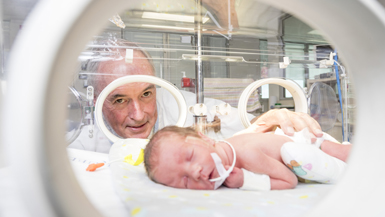Brain injury in babies: is stem cell treatment the answer?

Prof. Paul Colditz. Image courtesy of The University of Queensland
Royal Brisbane and Women’s Hospital (RBWH) neonatal expert Professor Paul Colditz has received a National Health and Medical Research Council (NHMRC) grant to explore stem cell treatment for babies with hypoxic ischaemic encephalopathy—a brain injury due to oxygen deprivation.
Prof Colditz, who leads The University of Queensland’s (UQ) Perinatal Research Centre, is looking at whether stem cells from the baby’s own placenta can be used to treat babies with brain injuries caused by interrupted oxygen supply or prematurity so that they grow up without impairment.
“Babies who get inadequate oxygen during labour will often have brain damage and in some cases do not survive,” Prof Colditz said.
“We are exploring whether stem cell therapy might save these babies from brain damage but there are many unknowns, such as which stem cells to use and how many.
“However, early research results are promising.
“We’ve looked at stem cells in animal models and we’ve had encouraging results from the preliminary data, which show the stem cells spreading throughout the brain.
“We injected stem cells into preclinical models and we’ve been able to show that they travel through the bloodstream to injured regions of the brain and reduce inflammation. They can then engraft into the brain with no apparent adverse side effects.”
Using the NHMRC grant, announced in December 2017, Prof Colditz and his team will now accelerate the research to find the best specific types of stem cells from the placenta and how many are needed to provide most benefit.
To find out more about this research, visit UQ’s Perinatal Research Centre website.
